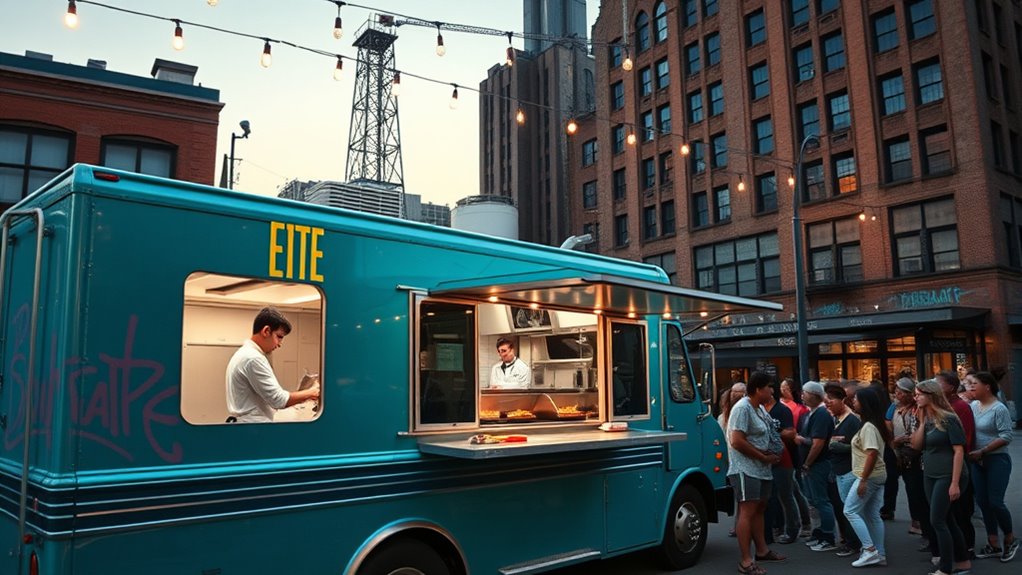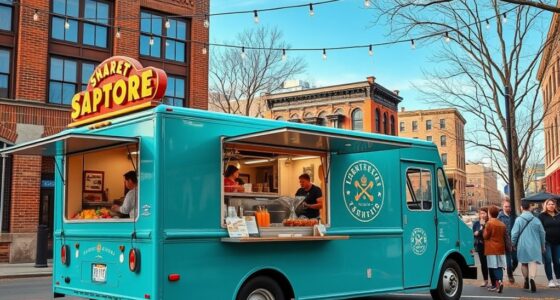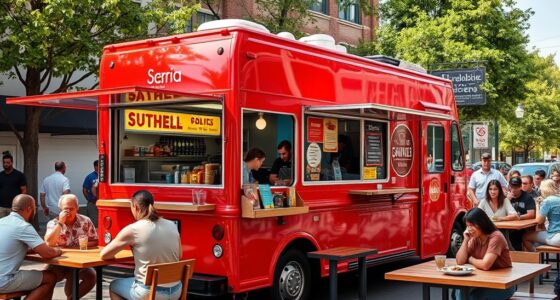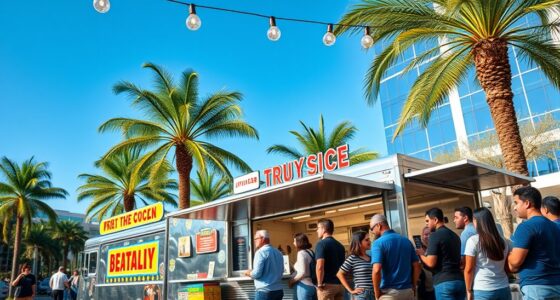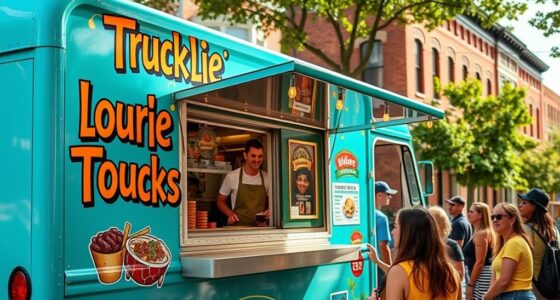To start a food truck in Detroit, you need to understand the city’s diverse food scene and local regulations, including parking and health standards. Set up your operations with the right equipment, secure permits, and plan your budget carefully. Focus on creating a catchy menu with local ingredients and use social media to build your brand. If you want to learn more about making your food truck a success in Detroit, keep exploring the details ahead.
Key Takeaways
- Research Detroit’s local food truck regulations, permits, and designated parking zones to ensure legal compliance.
- Develop a unique, eye-catching branding and menu that highlights local flavors and seasonal ingredients.
- Secure startup capital through loans, grants, or investors, and acquire necessary equipment and vehicle modifications.
- Register your food truck with health departments, pass sanitation inspections, and maintain proper documentation.
- Promote your food truck via social media, community events, and seasonal specials to attract and retain customers.
Food Scene Vibrant and Diverse

Detroit’s food scene is as lively and diverse as the city itself, offering a wide variety of flavors to satisfy any craving. As a food truck owner, you’ll find that food truck branding plays a key role in attracting customers amid the vibrant local food trends. Detroit residents enjoy everything from classic comfort foods to innovative fusion dishes, so staying updated on current trends helps you stand out. Incorporate eye-catching branding that reflects Detroit’s dynamic culture and local flavors, making your truck memorable. The city’s culinary scene encourages experimentation, so don’t be afraid to try new ideas that align with trending cuisines. Additionally, understanding the benefits of visual branding tools can help you create an appealing and recognizable presence. By understanding and embracing Detroit’s diverse palate, you’ll better connect with your audience and create a successful, recognizable food truck brand.
Understanding Local Requirements
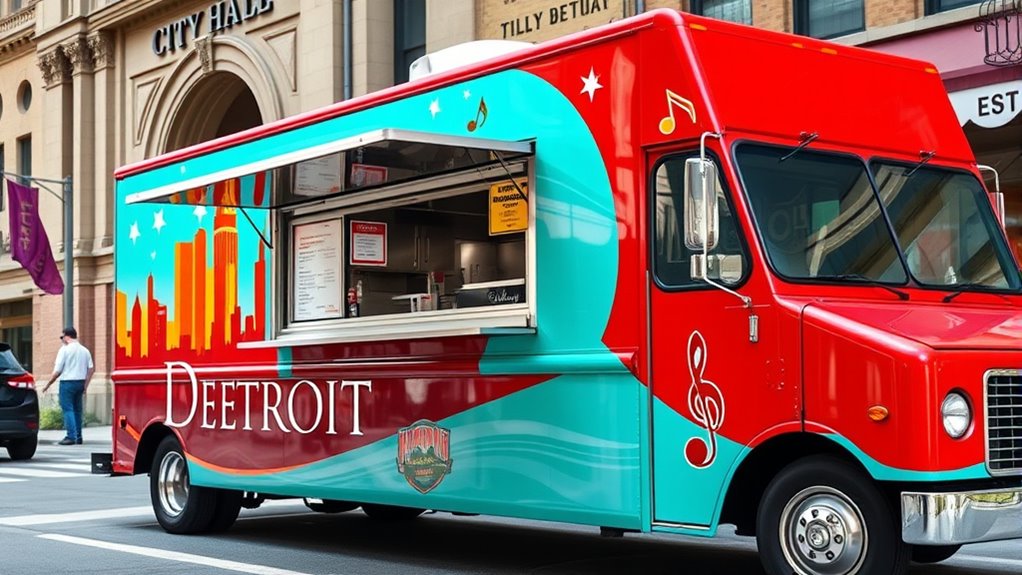
To operate your food truck in Detroit, you’ll need to navigate online permit application portals to get started. You must also meet sanitation standards and prepare the necessary documentation to stay compliant. Additionally, knowing the designated street parking zones guarantees you stay within local regulations and avoid fines. Incorporating community engagement strategies like sharing your location and menu updates on social media can help attract more customers.
Online Permit Application Portals
Are you aware of how to navigate the online permit application portals required for operating a food truck in Detroit? The city uses specific online permit portals to streamline your application submission process. These portals allow you to upload documents, pay fees, and track your application status easily. To help visualize, here’s a quick overview:
| Step | Action |
|---|---|
| 1 | Create an account on portal |
| 2 | Complete application form |
| 3 | Upload necessary documents |
| 4 | Pay application fees |
| 5 | Submit and track progress |
Using these online permit portals simplifies the process, ensuring you meet Detroit’s requirements efficiently and stay informed every step of the way.
Sanitation Standards and Documentation
Ensuring your food truck meets sanitation standards is essential for legal operation and customer safety. Detroit requires you to pass health inspections, which verify your compliance with local sanitation regulations. To prepare, you must maintain proper sanitation documentation, including records of cleaning schedules, temperature logs, and pest control measures. These documents demonstrate your commitment to hygiene and are vital during health inspections. Familiarize yourself with Michigan’s specific sanitation standards, as they may include guidelines for handwashing stations, waste disposal, and food storage. Regularly review and update your sanitation documentation to stay compliant. By staying diligent with cleanliness and proper record-keeping, you’ll ensure smooth inspections and build trust with customers. Fulfilling these requirements is a key step toward establishing a successful food truck business in Detroit.
Designated Street Parking Zones
Understanding the designated street parking zones in Detroit is essential for legally operating your food truck and avoiding fines. You need to familiarize yourself with parking enforcement rules and specific street signage indicating where trucks are allowed. Detroit designates certain areas for street parking, and these zones often have restrictions during peak hours or special events. Always look out for clear street signage that marks permitted parking zones for commercial vehicles like food trucks. Ignoring these signs can lead to tickets or towing. It’s your responsibility to park only in approved areas to stay compliant with local regulations. Regularly check for any updates or changes in signage to avoid violations and ensure smooth operations in your food truck business.
Setting Up Your Base of Operations
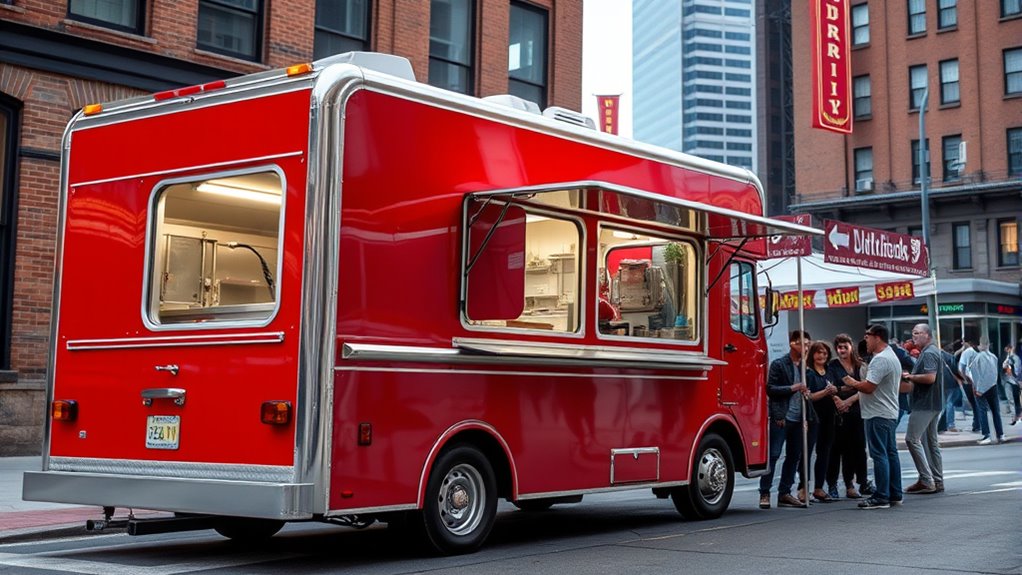
Choosing the right shared kitchen license options can save you time and money when setting up your base. You’ll also want to select custom kitchen equipment that fits your menu and space needs. Making these decisions early guarantees your operations run smoothly from the start. Additionally, considering portable camping equipment options for your food truck can improve mobility and flexibility during your operations.
Shared Kitchen Licensing Options
Setting up your food truck often involves finding a suitable commercial kitchen, and shared kitchen spaces offer a flexible and cost-effective solution. These shared kitchens come with various licensing options, making it easier to comply with local regulations. Using a shared kitchen can help you meet health codes and obtain necessary permits without investing in your own facility.
Consider these licensing options for shared kitchens:
- Temporary food service permits
- Commissary licensing requirements
- State and local health department approvals
- Food handler certifications
Custom Kitchen Equipment Selection
Selecting the right kitchen equipment is essential to guarantee your food truck operates efficiently and meets all health standards. Your custom kitchen must be tailored to your menu and workflow, so choose equipment that maximizes space and functionality. Focus on essential items like commercial-grade ovens, refrigeration, fryers, and prep stations. When making equipment selection, consider ease of cleaning, durability, and energy efficiency. Custom kitchen features can optimize your layout, ensuring smooth service and quick turnaround times. Invest in quality equipment that withstands daily use and aligns with local health regulations. Properly selecting your equipment now helps prevent costly upgrades later and sets a solid foundation for your food truck’s success in Detroit.
Budgeting and Financing Your Food Truck
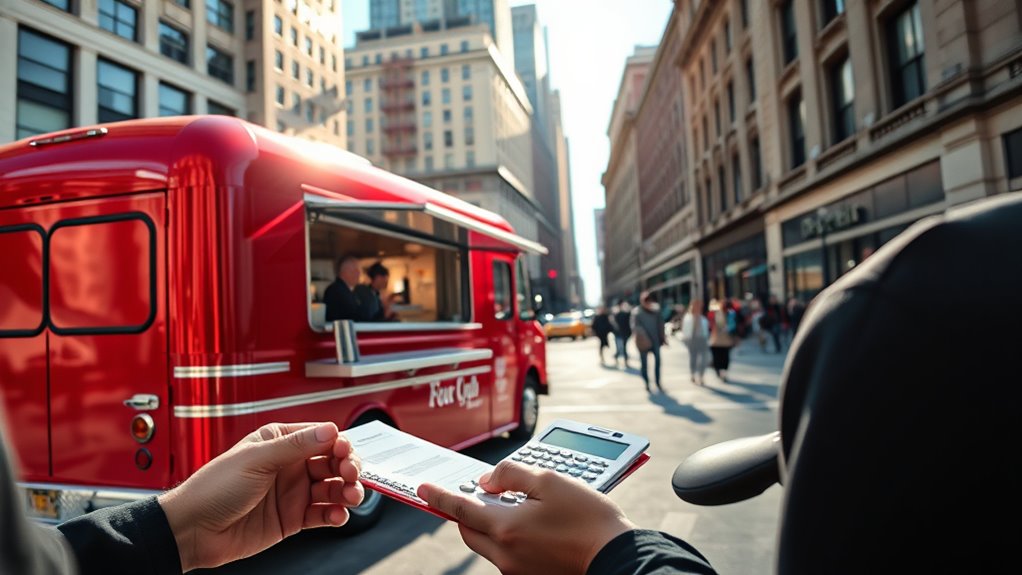
To get your food truck rolling, you’ll need to budget for vehicle customization costs and find reliable sources of startup capital. It’s also essential to plan for liability insurance to protect your business. Understanding these financial aspects early on helps guarantee your venture stays on track, and exploring options for business insurance can further safeguard your investment.
Initial Vehicle Customization Costs
Customizing your food truck can be a significant upfront expense, so it’s vital to plan your budget carefully. Initial vehicle customization costs vary based on the scope of work, but key expenses include a vehicle wrap or a paint job to make your truck stand out. A vehicle wrap offers a cost-effective way to showcase your branding, while a custom paint job provides a unique, long-lasting finish. Other costs to consider are installing equipment, signage, and interior modifications. Keep in mind that quality matters—investing in durable materials saves money long-term. To stay within your budget, compare quotes from different vendors and prioritize high-impact customizations that attract customers. Proper planning ensures your investment boosts your brand and maximizes your food truck’s potential.
Startup Capital Sources
Securing startup capital is a crucial step in launching your food truck, and there are several options to contemplate. Funding grants can provide non-repayable financial support, especially if your concept aligns with community or economic development programs. Investigate local and national grants geared toward small businesses and food startups in Detroit. Additionally, tapping into investor networks can help you find individuals interested in funding innovative food ventures. These networks connect entrepreneurs with potential investors who see value in your idea and are willing to provide capital in exchange for a share of profits. Combining grants and investor funding can give you a solid financial foundation, reducing personal financial risk and ensuring you have enough capital to cover vehicle customization, equipment, and initial inventory.
Liability Insurance for Food Trucks
Liability insurance is an indispensable expense when budgeting for your food truck, as it protects you from potential legal and financial risks. Having proper liability coverage ensures you’re covered if someone is injured or if there’s property damage during your operations. Without it, insurance claims could leave you responsible for hefty costs. When selecting a policy, consider coverage limits that match your business size and menu offerings. Remember, liability insurance not only safeguards your assets but also builds trust with customers and vendors. Keep in mind that insurance claims can arise unexpectedly, so being prepared with the right coverage is crucial. Proper liability insurance helps you focus on growing your food truck business without the stress of unforeseen legal issues.
Designing Your Menu and Pricing Strategy
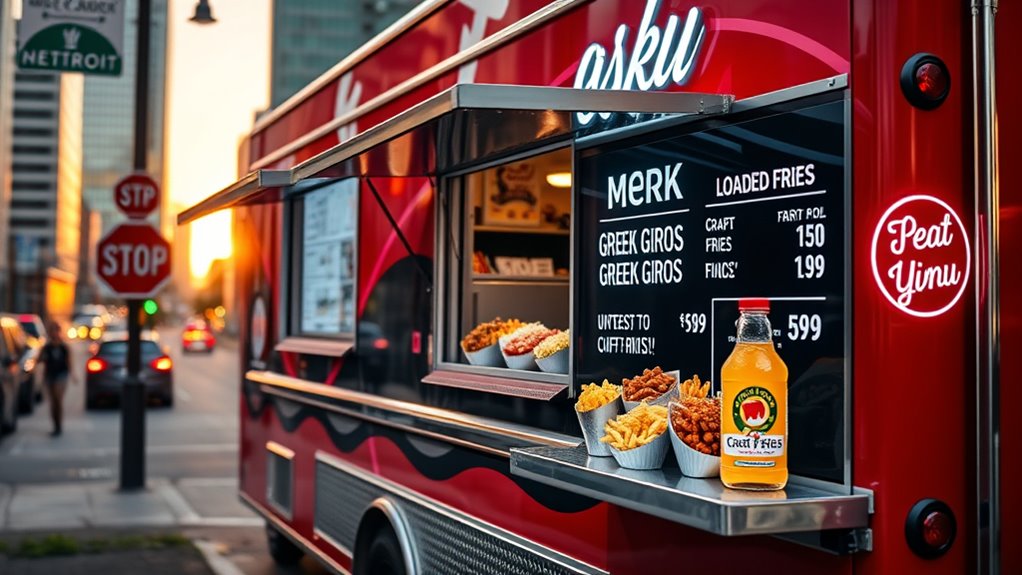
When designing your menu, consider sourcing seasonal ingredients to keep costs down and guarantee fresh flavors. Managing portion sizes helps control expenses and maintain consistent quality. Balancing these strategies allows you to set competitive prices while maximizing profit. Additionally, implementing cybersecurity measures can protect your payment systems from potential threats.
Seasonal Ingredient Sourcing Strategies
Incorporating seasonal ingredients into your menu allows you to create fresh, appealing dishes while managing costs effectively. By sourcing local, seasonal produce, you support local farmers and reduce transportation costs, which can improve your profit margins. To make the most of this strategy, consider these approaches:
- Build relationships with local farmers and markets for reliable sourcing
- Adjust your menu frequently to highlight what’s in season
- Use preserved or frozen seasonal ingredients during off-peak times
- Highlight seasonal sourcing in your marketing to attract eco-conscious customers
Focusing on sourcing local, seasonal produce helps you deliver high-quality, fresh dishes that resonate with your customers and differentiate your food truck in Detroit’s competitive scene.
Cost Control Through Portion Management
Effective portion management is essential for controlling costs and maximizing profits on your Detroit food truck. By practicing portion control, you can reduce waste and ensure consistent servings, which directly improves your cost management. Carefully designing your menu with precise portion sizes helps you monitor ingredient usage and prevent over-serving. This not only keeps your food costs in check but also maintains customer satisfaction through consistent quality. Implementing standard portion sizes across your offerings simplifies inventory management and pricing strategies. Regularly reviewing and adjusting portion sizes based on sales data can further optimize your margins. Ultimately, disciplined portion control allows you to balance quality and affordability, helping your food truck stay profitable while offering value to your customers.
Technology and Operations

You can streamline transactions by offering mobile payment options, making it easier for customers to pay quickly. Real-time stock tracking software helps you stay on top of inventory, reducing waste and ensuring popular items are always available. Incorporating these technologies can boost efficiency and improve the overall operation of your food truck.
Mobile Payment Options for Vendors
Are mobile payment options changing the way food truck vendors operate in Detroit? Absolutely. With contactless payments and mobile POS systems, you can serve customers faster and more securely. These options reduce cash handling, minimize errors, and streamline transactions. You’ll benefit from:
- Faster checkout times, increasing customer turnover
- Enhanced security with encrypted payment methods
- Flexibility to accept various forms of digital payments
- Easy integration with inventory and sales tracking apps
Implementing mobile payment options helps you stay competitive and meet customer expectations for quick, contactless service. Plus, it guaranteesrecord-keeping and reduces cash management issues. As a vendor in Detroit, embracing these technologies ensures smoother operations and happier customers.
Real-Time Stock Tracking Software
Implementing real-time stock tracking software transforms how food truck vendors manage inventory throughout the day. With this technology, you can monitor stock levels instantly, preventing shortages or overstocking. It streamlines inventory management by providing accurate data on ingredient usage, so you know exactly when to restock. Order tracking features enable you to see which supplies are running low and prioritize procurement, saving you time and reducing waste. This software also helps optimize menu offerings based on current inventory, minimizing spoilage and maximizing profits. By automating these processes, you gain better control over your stock, ensuring you meet customer demand efficiently. Overall, real-time stock tracking software enhances operational efficiency, allowing you to focus on delivering excellent food and service rather than worrying about inventory errors.
Marketing and Growing Your Presence
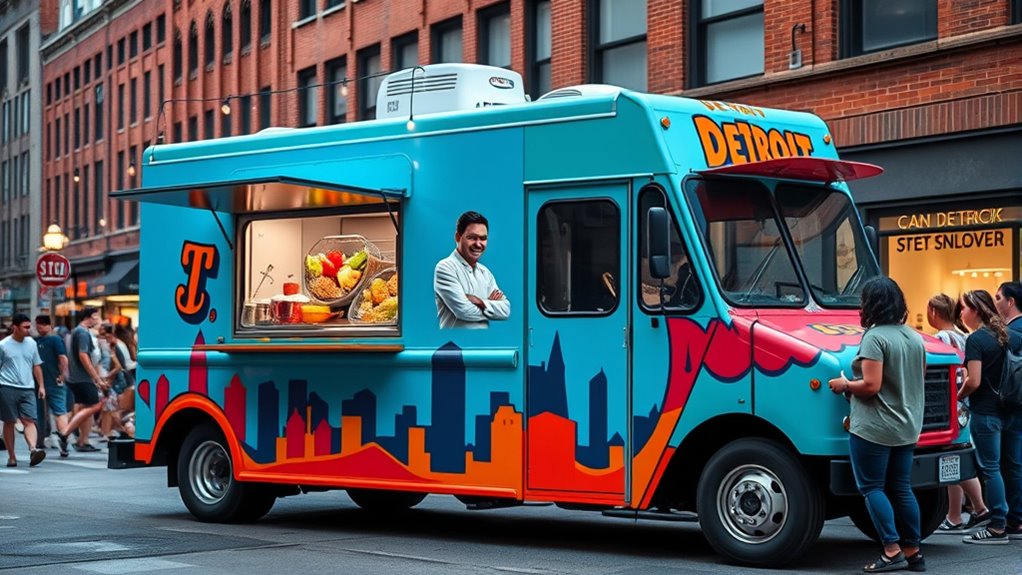
To grow your food truck’s presence in Detroit, you should leverage popular event scheduling apps to reach more customers. Posting engaging food photos on Instagram helps attract followers and build excitement around your offerings. Combining these strategies can boost your visibility and draw more hungry crowds your way.
Popular Event Scheduling Apps
Using popular event scheduling apps can considerably boost your food truck’s visibility and attract more customers. These apps help you plan and promote your appearances, making it easier to reach your target audience. By integrating with social media, you can enhance customer engagement and spread the word quickly. When you list your events on these platforms, you increase the chances of being discovered by new customers and loyal fans alike. Plus, they often provide analytics to track engagement and optimize your marketing efforts. To get started, consider these tools:
- Eventbrite
- Meetup
- Facebook Events
- Eventful
Utilizing these apps not only streamlines your scheduling but also amplifies your presence in the community, helping your food truck thrive in Detroit’s vibrant scene.
Engaging Instagram Food Photos
Capturing eye-catching Instagram food photos can substantially boost your food truck’s visibility and attract new customers in Detroit’s competitive scene. Focus on food styling to make dishes look appealing and vibrant. Use lighting techniques like natural light or soft diffusers to highlight textures and colors, avoiding harsh shadows. Consistent, high-quality images encourage followers to engage and share. To deepen your understanding, consider this table:
| Food Styling Tips | Lighting Techniques |
|---|---|
| Use fresh ingredients for color pop | Shoot during golden hour for warmth |
| Arrange food neatly and creatively | Avoid direct flash, opt for diffused light |
| Add garnishes for visual interest | Use reflectors to bounce light |
| Keep backgrounds simple | Experiment with angles and shadows |
Detroit Food Truck Success Tips

Achieving success with a food truck in Detroit requires strategic planning and a deep understanding of the local market. Focus on menu innovation to stand out and keep customers excited. Regularly introduce new dishes or seasonal specials that reflect Detroit’s diverse culinary scene. Prioritize customer engagement by interacting with patrons and gathering feedback, which helps refine your offerings. To boost visibility, participate in local festivals and community events. Build a loyal customer base by offering loyalty programs or discounts for repeat visits. Keep your truck well-maintained and ensure your staff provides friendly, efficient service. Staying adaptable and connected to Detroit’s food trends will help you thrive in this competitive market. Remember, a combination of creative menu ideas and strong customer relationships is key.
Frequently Asked Questions
What Permits Are Required for Food Trucks in Detroit?
You need to obtain food truck permits to operate legally in Detroit. Start by applying for a mobile food vendor permit from the Detroit Department of Health, which guarantees you meet health and safety regulations. You’ll also need a business license and possibly zoning approvals depending on your chosen location. Make sure to review Detroit regulations thoroughly to stay compliant and avoid any issues with local authorities.
How Do I Find the Best Locations to Park My Food Truck?
Finding the best parking spots is like catching lightning in a bottle—exciting and rewarding. You should scout areas with high foot traffic like downtown, near offices, or event venues. Visit potential spots during peak hours, observe foot traffic, and check local regulations. Talk to other food truck owners for insider tips. The perfect location hinges on visibility and the crowd, so stay flexible and keep exploring until you strike gold.
Are There Local Food Safety Regulations Specific to Detroit?
Yes, Detroit has specific food safety regulations you need to follow. You must complete food safety training to guarantee you’re aware of local standards. During the health inspection process, officials check your truck for proper food handling, sanitation, and storage. Make sure your truck meets all requirements, keeps documentation updated, and adheres to Detroit’s health codes. Staying compliant helps you pass inspections smoothly and serve safe, quality food to your customers.
What Are the Common Challenges Faced by Food Truck Owners in Detroit?
You’ll face challenges like seasonal fluctuations, which can drop your income by up to 30% during winter months. Maintaining customer retention is tough in Detroit’s competitive market, especially with new trucks constantly popping up. Weather can be unpredictable, affecting your schedule and sales. Managing local regulations and finding reliable staff also add stress. Staying adaptable and building a loyal customer base help you overcome these hurdles and thrive in the Detroit food scene.
How Can I Build Relationships With Detroit’s Local Vendors and Suppliers?
You can build relationships with Detroit’s local vendors and suppliers through active supplier networking and vendor collaboration. Attend local markets, industry events, and join food truck associations to connect with potential partners. Be consistent, communicate openly, and support local businesses. Establish trust by offering fair terms and sharing your goals. Building strong relationships fosters mutual growth and guarantees you have reliable access to quality ingredients and supplies.
Conclusion
Starting a food truck in Detroit might seem challenging, but with passion and persistence, you can thrive here. Don’t let concerns about competition hold you back—focus on what makes your food unique and connect with the community. Success isn’t just about the truck; it’s about your dedication to delivering great flavors and building relationships. Keep pushing forward, and Detroit’s vibrant food scene will embrace your journey. Your culinary adventure starts now—just take that first step.
